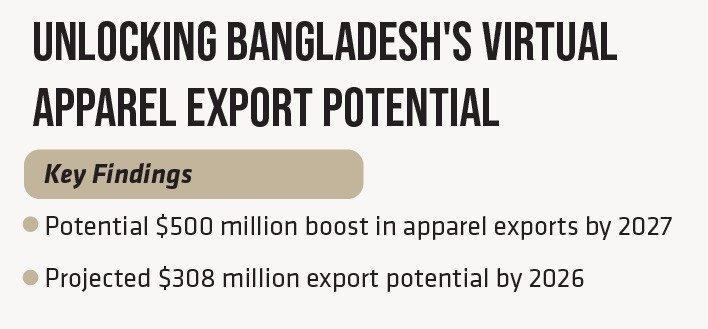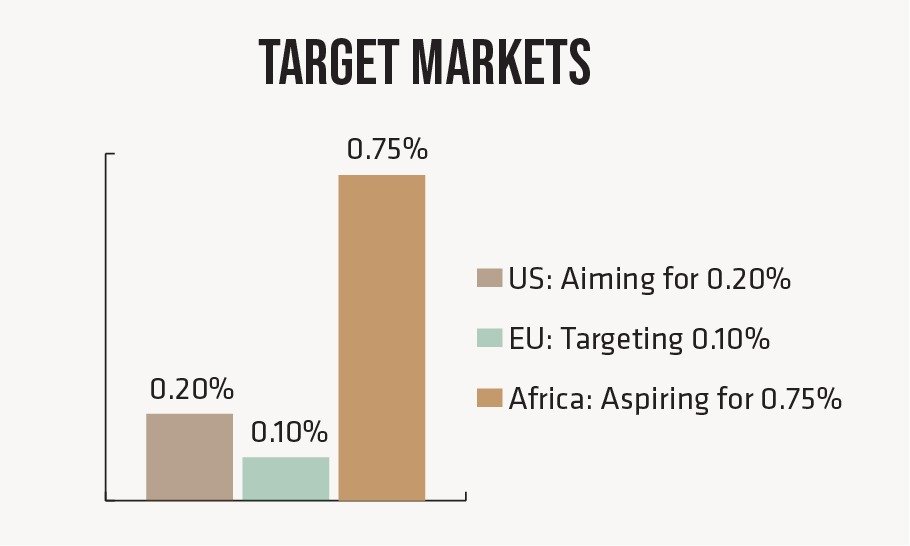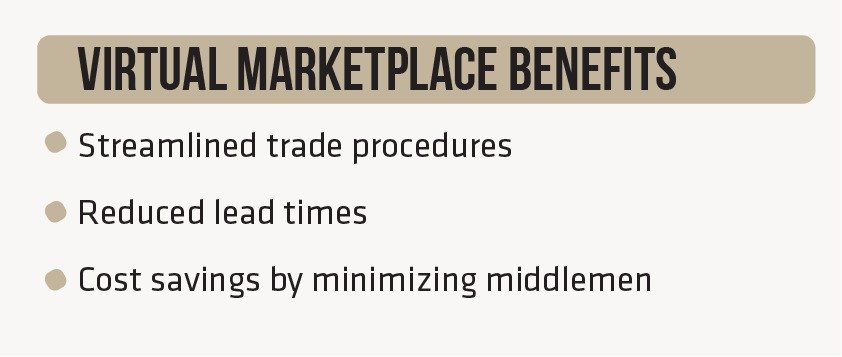Key Highlights:
- Significant potential for online shopping
- Emphasizes the need for a comprehensive business model
- Integration of Bangladesh’s textile industry into global value chains
- A call for policy reforms to unlock the full potential of Bangladesh’s apparel sector in the digital era
In the wake of the digital revolution, Bangladesh’s apparel sector faces significant hurdles in establishing a virtual marketplace, as revealed by a recent study titled ‘Establishing a Virtual Marketplace for Bangladeshi Apparels.’ This insightful research, conducted by LightCastle Partners and funded by IFC’s Partnership for Cleaner Textile (PaCT II) program, delves into the complexities hindering the seamless integration of the country’s apparel industry into the digital landscape.
You can also read: US Dollar’s Decline in Ranking Among the World’s Top 10
One of the primary challenges identified in the study is the limited cross-border virtual payments, obstructing the smooth flow of transactions between international buyers and local manufacturers. This barrier impedes the sector’s ability to tap into the vast global market and capitalize on the growing trend of online shopping.
In addition to the virtual payment challenges, the study underscores longer lead times associated with online transactions compared to traditional methods. This extended processing time significantly hampers the efficiency and competitiveness of Bangladesh’s apparel sector on the global stage, necessitating prompt and strategic interventions.

Policy Reforms: A Call to Action
The study, conducted by LightCastle Partners and funded by IFC’s Partnership for Cleaner Textile (PaCT II) program, emphasizes the urgent need for policy reforms to overcome these obstacles.
It suggests several strategic measures to pave the way for a successful virtual marketplace in the country:
Facilitation of Pre-Payment
One of the proposed policy reforms is the facilitation of pre-payment. Streamlining the payment process can reduce lead times and enhance the overall efficiency of online transactions in the apparel sector.
Digital Commerce Policies for International Trade
Preparing digital commerce policies specifically tailored for international trade is another crucial recommendation. Clear guidelines and frameworks can create a conducive environment for cross-border transactions, fostering the growth of the virtual marketplace.
Establishment of R-Commerce Export Zones
The study advocates for the creation of R-Commerce Export Zones, dedicated areas that prioritize and facilitate digital commerce for the apparel sector. These zones can serve as hubs for innovation, collaboration, and seamless transactions.
Sustainable Business Models for Success
The research not only identifies challenges but also proposes sustainable business models essential for the successful implementation of the virtual marketplace. The primary goal is to integrate Bangladesh’s textile industry into global value chains and capitalize on the increasing trend of online shopping.
Expansion of B2B Activities
The report emphasizes expanding Business-to-Business (B2B) activities into emerging markets, such as Asia and the Middle East. This strategic approach aims to broaden market reach and strengthen global connections.
Creation of Direct Connections (B2C)
To achieve superior profit margins and increased business volume, the study suggests creating direct connections between Bangladeshi manufacturers and end customers (B2C). This approach adds value to the industry by establishing a direct link between producers and consumers.

The Role of Virtual Marketplace Platforms
The proposed virtual marketplace platforms will operate as independent private entities. They will offer logistical assistance, design consultation services, secure
payment systems, and spare capacity matching. These features aim to enhance the overall user experience and facilitate seamless interactions between local producers, traders, and international buyers.



BGMEA’s Vision for the Future
BGMEA President Faruque Hassan envisions a comprehensive business model for Bangladesh’s apparel sector to maintain its position in global competition. He believes that the report not only supports the expansion of the industry’s presence in the digital realm but also provides a guiding framework for future business expansion endeavors.

President Hassan also expressed Bangladesh’s ambition to increase its market share to 12% by 2030, emphasizing the importance of virtual retailing in strengthening the country’s position in the global fashion arena. The virtual marketplace, as outlined in the study, is poised to play a pivotal role in achieving this ambitious goal.
Unlocking Bangladesh’s Virtual Apparel Export Potential



Targets $500 million by 2027
A recent study by the International Finance Corporation (IFC) and LightCastle indicates that Bangladesh has the potential to increase its apparel exports by $500 million through virtual marketplaces to the US, the EU, and Africa by 2027. The study also projects a $308 million export potential by 2026. With a shift of one-third of apparel sales to online channels in the EU and the US by 2027, Bangladesh aims to secure 0.20% of the US, 0.10% of the EU, and 0.75% of the African virtual apparel markets, amounting to an estimated $489 million.
Dipa Sultana, a senior business consultant, highlights the benefits of a virtual marketplace, including streamlined international trade procedures, reduced lead times, and cost savings by minimizing middlemen.
“The virtual marketplace will reduce the lead time and the cost of business and simplify business procedures in international trade,” said Dipa Sultana.
BGMEA President Faruque Hassan envisions direct access for local suppliers to various markets, seeking policy support for international e-commerce in virtual platforms. Shovon Islam, Chairman of BGMEA‘s Standing Committee on Press and Publicity, foresees targeting small brands through a business-to-business (B2B) model and calls for financial support from entities like the World Bank for the establishment of virtual marketplaces. In the fiscal year 2022-23, Bangladesh exported garment items worth $46.99 billion, emphasizing the industry’s economic significance.
In conclusion, the unveiled study not only identifies challenges but paves the way for transformative solutions, positioning Bangladesh’s apparel sector to thrive in the digital era. As virtual retailing strengthens its position, the emphasis on embracing this shift signifies a forward-thinking approach to secure a significant global market share in the coming decade.


